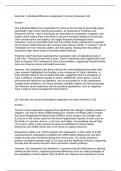Describe 1 individual differences explanation for stress behaviour (10)
Answer -:
One individual differences explanation for stress is the concept of personality types,
specifically Type A and Type B personalities, as proposed by Friedman and
Rosenman (1974). Type A individuals are described as competitive, impatient, and
hostile, which makes them more likely to perceive everyday situations as stressful.
Their constant drive and urgency can trigger frequent physiological stress
responses, such as increased heart rate and cortisol levels, putting them at greater
risk of stress-related illnesses like coronary heart disease (CHD). In contrast, Type B
individuals are more relaxed, patient, and easy-going, making them less likely to
experience high stress levels or develop related illnesses.
Friedman and Rosenman supported this explanation with a longitudinal study of
3,000 men. They found that over 8 years, Type A individuals were significantly more
likely to develop CHD compared to Type B personalities, suggesting that personality
traits can influence stress and health outcomes.
However, this explanation has been criticized for oversimplifying personality traits.
Later research highlighted that hostility, a key component of Type A behavior, is
most strongly linked to stress-related illnesses, suggesting that not all aspects of
Type A behavior contribute equally to stress. Additionally, other factors, such as
environmental influences and genetics, are not accounted for in this explanation.
Despite these limitations, the theory provides valuable insights into how personality
can influence stress responses and has practical applications, such as targeting
Type A traits in stress management interventions.
Q2. Describe one social psychological explanation for stress behaviour (10)
Answer -:
The life events explanation suggests that significant life changes, whether positive or
negative, can lead to stress-related behaviours. Holmes and Rahe (1967) created
the Social Readjustment Rating Scale (SRRS), which assigns Life Change Units
(LCUs) to 43 life events based on the level of adjustment required. Events such as
the death of a spouse, divorce, or job loss rank highly. Accumulating several high-
LCU events within a short period increases the likelihood of stress-related
behaviours and health issues due to the strain on coping resources.
Research by Rahe et al. (1970) supports this explanation. In their study of 2,500
naval personnel, participants completed the SRRS before deployment, and their
health records were monitored during their time at sea. The results showed a
positive correlation between high LCU scores and the likelihood of illness, supporting
the idea that life events increase stress and lead to health problems.
However, this explanation has limitations. It assumes that all individuals are affected
similarly by life events, neglecting personal differences such as coping strategies or
the availability of social support, both of which can influence how stressful an event





